Every fast-growing eCommerce brand hits the same breaking point.
Orders surge, SKUs multiply, sales channels expand and suddenly the spreadsheet that once worked becomes the reason inventory slips through the cracks.
Products go out of stock mid-campaign. Cash gets stuck in slow movers. Teams scramble instead of scaling.
That’s where inventory planning software changes everything.
It turns chaos into control, making your stock decisions proactive, not reactive.
In this guide, we’re spotlighting the 10 best inventory planning tools in 2026 with their key features, pros, cons, pricing and who they are best for so that you can find the best software for your need.
What Is Inventory Planning and Why It Matters
Inventory planning is the process of ensuring the right products are available at the right time, in the right quantity, and at the right place without tying up too much cash in excess stock.
When done right, inventory planning helps your business:
- Avoid stockouts, so your bestsellers are always available when customers want them.
- Reduce overstocking, freeing up capital that would otherwise sit on shelves.
- Shorten lead times by aligning supplier orders with actual demand patterns.
- Boost margins through more accurate purchasing and less wastage.
And, Inventory planning software helps eCommerce businesses decide what to reorder, when to reorder, and how much to stock based on demand forecasts, lead times, and inventory constraints.
Here are the 10 Best Inventory Planning software that you need to look out for in 2026.
Sumtracker
Sumtracker is built specifically for eCommerce brands that sell across multiple channels like Shopify, Amazon, Etsy, and eBay. Unlike clunky ERPs or spreadsheets, it gives teams a clear, real-time view of inventory across every store and marketplace.
With powerful forecasting, automated replenishment, and accurate bundle tracking, it ensures merchants never oversell, understock, or lose revenue because of poor visibility.
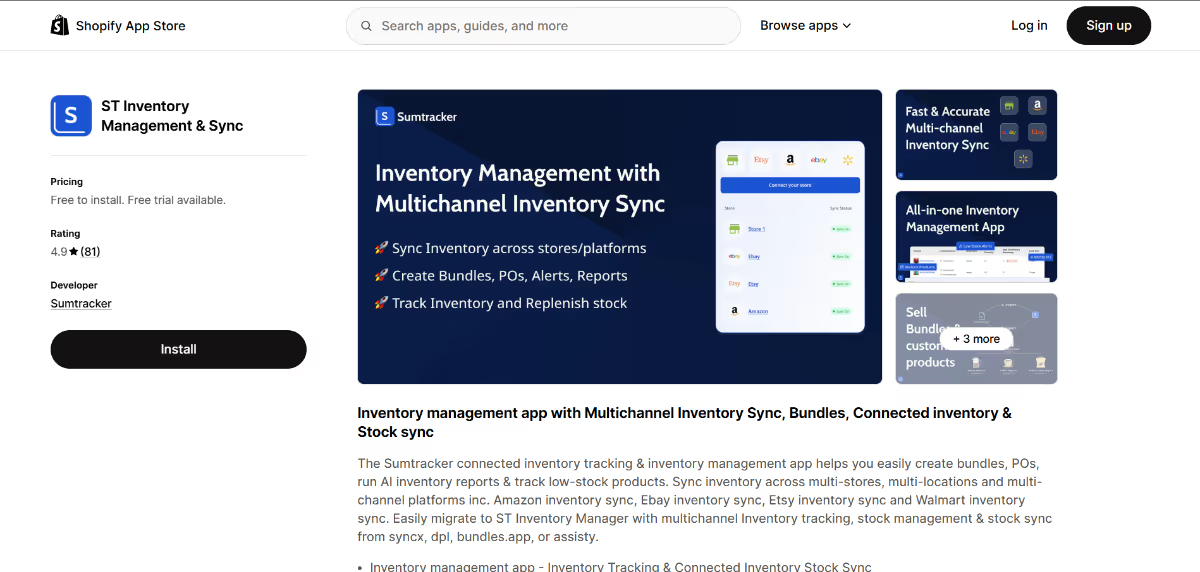
Key Features:
- Real-Time Multichannel Sync – Instantly updates stock across Shopify, Amazon, Etsy, eBay, and more, so you never oversell.
- Automated Replenishment & PO Workflows – Get smart restock suggestions, automate purchase orders, and streamline vendor management.
- Bundle & Component-Level Tracking – Perfect for brands selling kits or multi-component products.
- ABC Analysis & Reports – Spot top movers, slow movers, and plan replenishment intelligently.
- Multi-Location Support – Easily track inventory across multiple warehouses and storefronts.
Best For:
Fast-growing eCommerce brands selling across multiple online channels
Pros:
- Designed for fast-moving eCommerce, not legacy ERP workflows
- Easy onboarding and clean interface (no training required)
- Flexible pricing that scales with order volume
- Accurate bundle deductions and PO automation that save hours weekly
Cons:
- Not a full manufacturing ERP (focused on inventory, not production)
- Limited accounting features (integrates with accounting tools instead of replacing them)
Pricing:
Starts at $49/month for up to 200 monthly orders.
Inventory Planner by Sage
Inventory Planner by Sage is best known for its powerful demand forecasting engine. It helps merchants plan inventory intelligently, reduce stockouts, and optimize cash flow with data-driven insights.
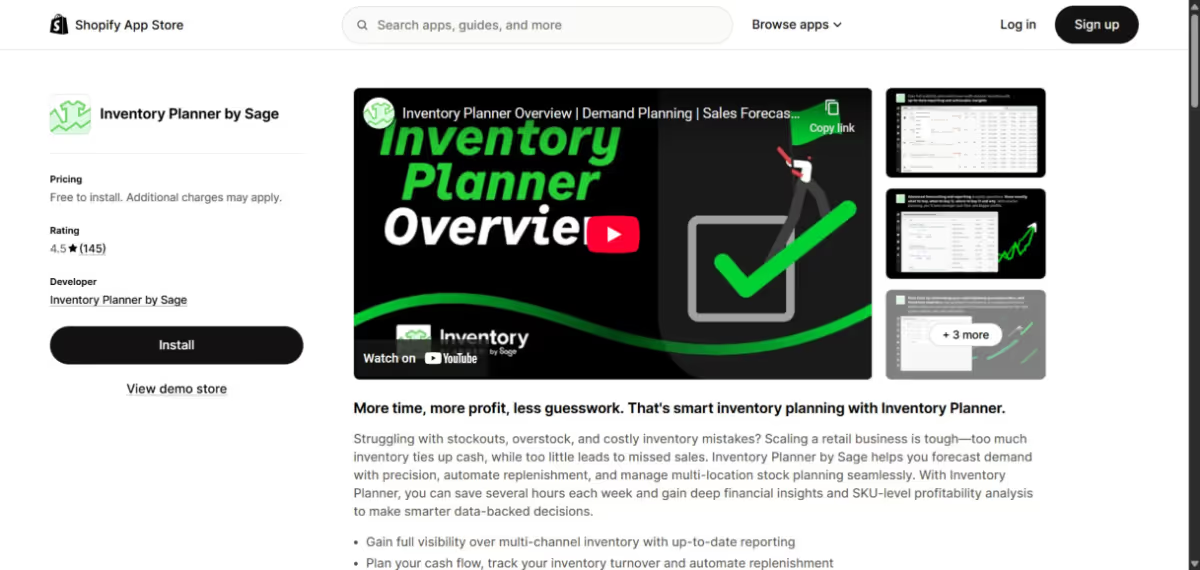
Key Features:
- Forecasting with seasonality and velocity tracking
- Dynamic replenishment suggestions
- Multi-warehouse and vendor planning
- In-depth reporting dashboards
Best For:
Established eCommerce and retail brands
Pros:
- Excellent forecasting accuracy
- Wide integration ecosystem
- Strong analytics for growing teams
Cons:
- Not designed as a full inventory control system
- Pricing isn’t fully transparent
Pricing:
Starts around $244/month, with costs scaling based on inventory volume and sales channels.
Prediko
Prediko focuses on making forecasting simple and fast for Shopify brands. It’s a plug-and-play solution designed for lean teams that want better visibility into future stock needs.
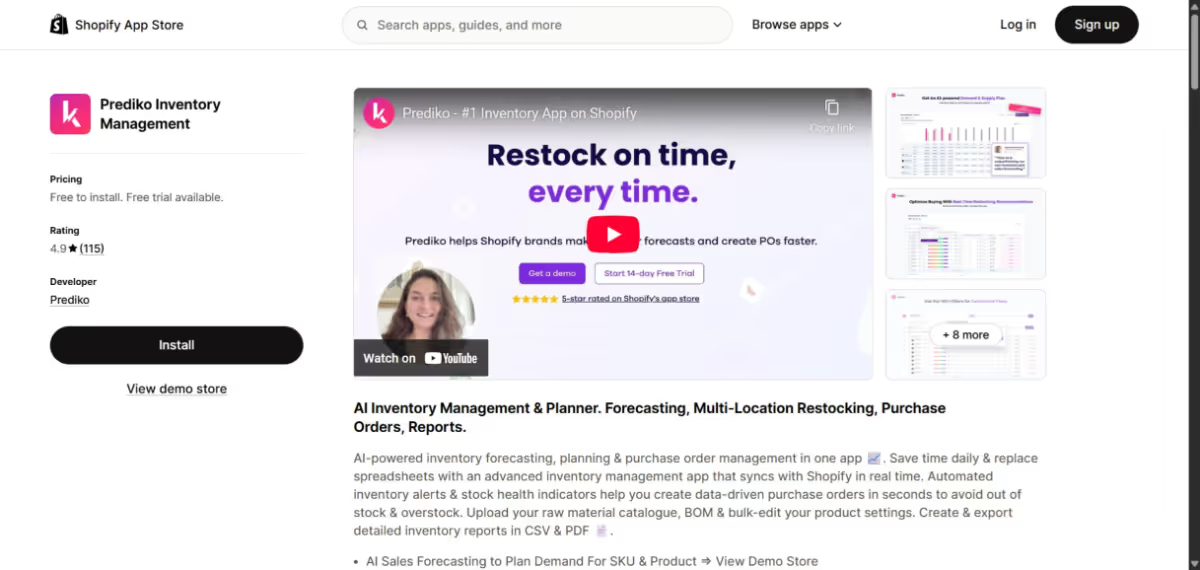
Key Features:
- Shopify-native demand forecasting
- Restock alerts and timing suggestions
- Simple, clean dashboard
Best For:
Shopify-first businesses with lean teams
Pros:
- Easy to use, minimal learning curve
- Great for smaller brands or first-time planners
Cons:
- Limited advanced features
- Less suitable for multichannel or large SKUs
Pricing:
Starts around $49/month
Cogsy
Cogsy blends inventory planning with revenue forecasting to help DTC brands make smarter restocking decisions. It focuses on operational visibility and profitability.
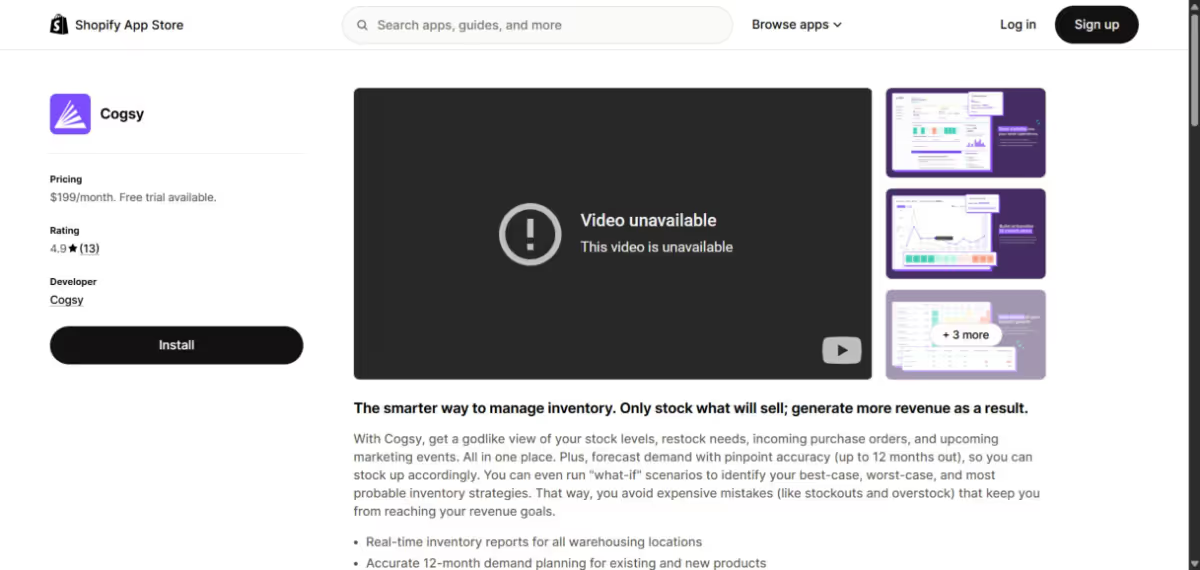
Key Features:
- Demand forecasting tied to revenue goals
- Sell-through planning to maintain lean inventory
- Integrations with Shopify and other platforms
Best For:
DTC brands focused on balancing growth
Pros:
- Great for revenue-driven planning
- Modern, intuitive interface
Cons:
- Lacks deep supply chain features for complex businesses
- Pricing not fully transparent
Pricing:
A standard plan starts at $199/month, with custom pricing for bigger operations.
Fabrikator
Fabrikator is a lightweight forecasting tool built for smaller teams. It helps brands anticipate stock needs with simple dashboards and clear reorder recommendations.
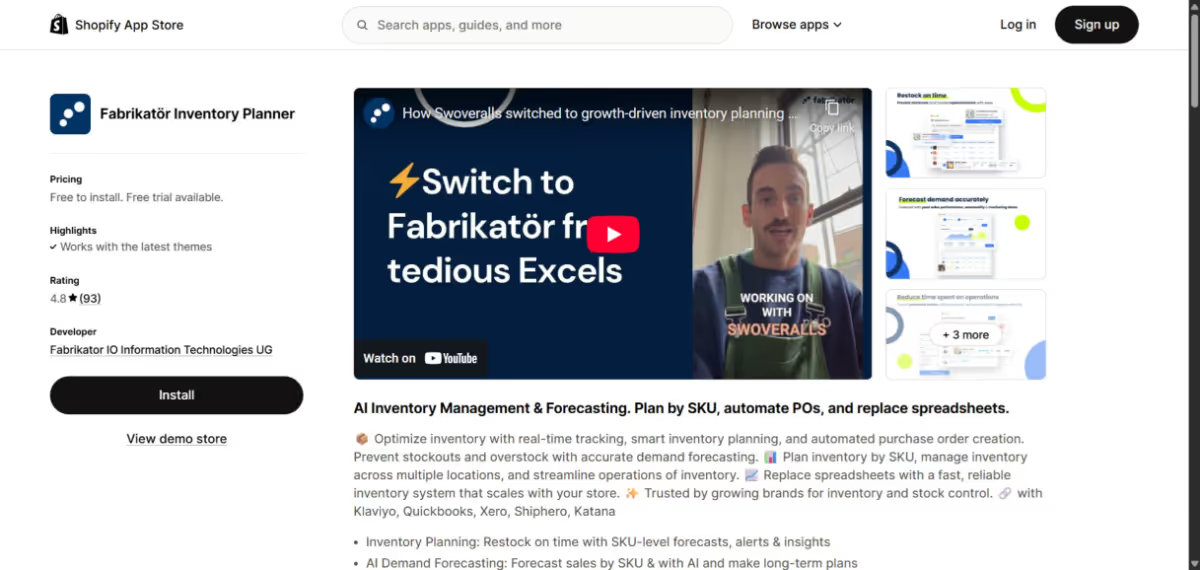
Key Features:
- Forecasting based on order history
- Low-stock and backorder alerts
- Easy-to-use planning interface
Best For:
Small to mid-size Shopify stores
Pros:
- Quick onboarding, beginner-friendly
- Ideal for lean teams and small catalogs
Cons:
- Limited features for complex operations
- No multi-location or advanced reporting
Pricing:Tiered plans start around $79/ per month, with pricing increases depending on features and usage.
Netstock
Netstock is a robust planning solution designed for distributors, wholesalers, and retail brands with complex inventory structures. It’s built to optimize stock levels and working capital.
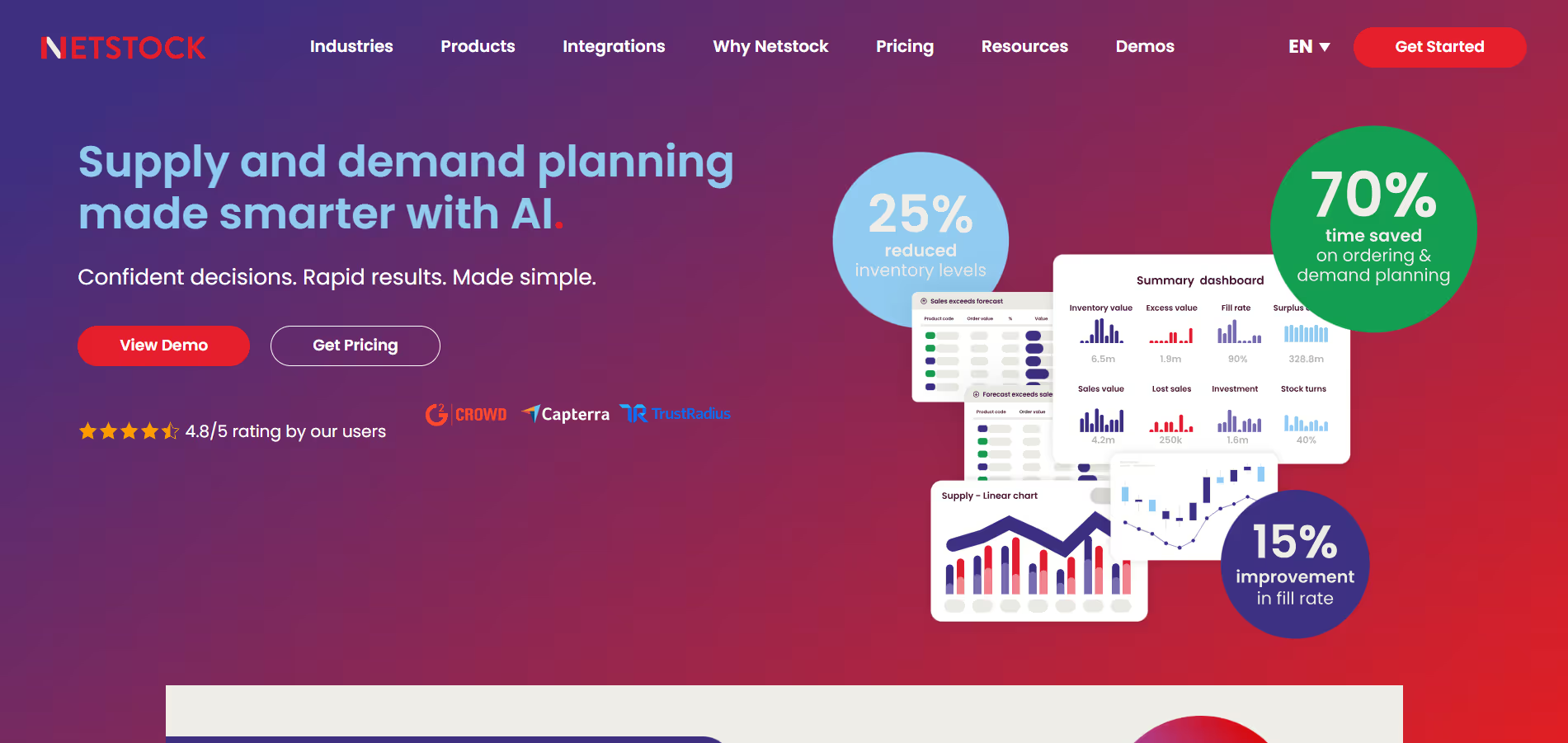
Key Features:
- Advanced forecasting and optimization
- Supplier performance tracking
- Multi-location support
- ERP and eCommerce integrations
Best For:
Mid-market distributors and wholesalers
Pros:
- Strong forecasting and planning depth
- Excellent for scaling operations
Cons:
- Price and setup more suitable for larger teams
- Overkill for small sellers
Pricing:
Custom quotes; typically used by mid-market and enterprise businesses.
Blue Ridge
Blue Ridge uses AI-driven demand planning and replenishment to help businesses manage inventory at scale. It’s built for companies with complex supply chains and fluctuating demand.

Key Features:
- AI-based demand forecasting
- Automated replenishment planning
- Real-time supply chain visibility
- Advanced analytics
Best For:
Large businesses managing complex supply chains
Pros:
- Excellent for complex, high-volume operations
- Focuses on cost optimization
Cons:
- Expensive and complex to implement
- Not suited for smaller eCommerce brands
Pricing:
Quote-based enterprise pricing.
SAP Integrated Business Planning (IBP)
SAP Integrated Business Planning is a full-scale enterprise planning platform. It combines demand forecasting, supply planning, and scenario modeling for global operations.
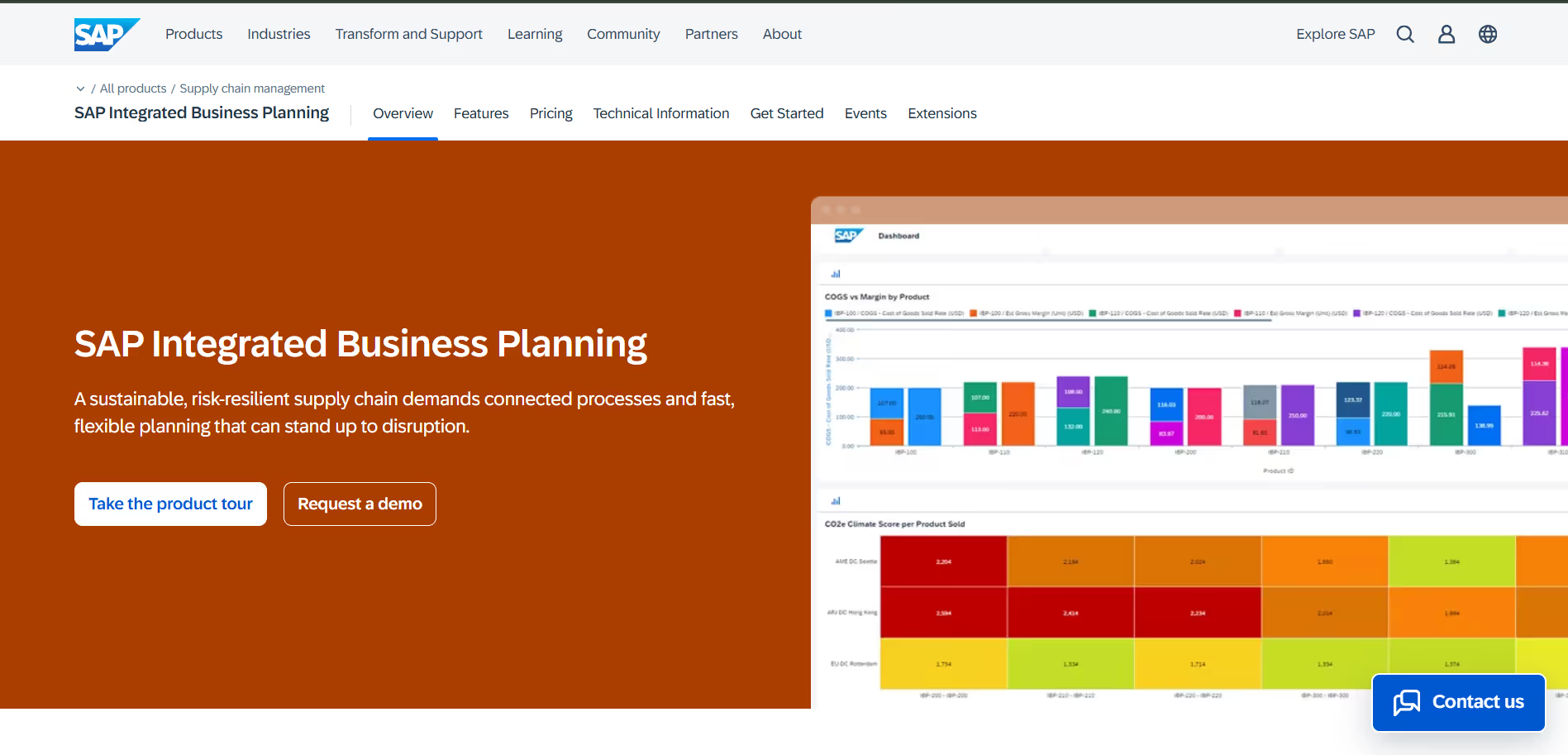
Key Features:
- Unified demand and supply planning
- Scenario simulations and “what-if” modeling
- Deep integration with SAP ERP
Best For:
Global enterprises with multi-region operations
Pros:
- Highly powerful and scalable
- Ideal for enterprise-level operations
Cons:
- High implementation cost and complexity
- Long onboarding time
Pricing:
Enterprise-level pricing, fully custom.
NetSuite ERP
NetSuite ERP integrates inventory planning directly into its cloud ERP system, giving businesses end-to-end visibility across financials, operations, and supply chain.
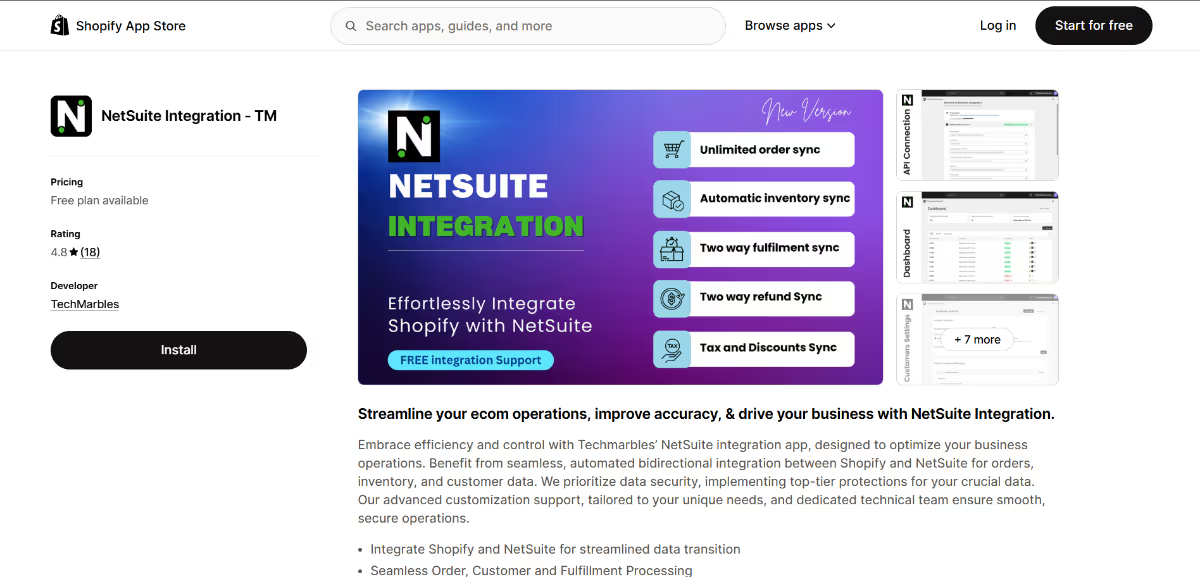
Key Features:
- Demand and supply planning
- Global inventory visibility
- Advanced automation and workflows
Best For:
Mid-to-large businesses with finance and operations.
Pros:
- All-in-one ERP + planning solution
- Strong reporting and control
Cons:
- High cost and steep learning curve
- May be more than needed for small teams
Pricing:
Custom enterprise pricing based on modules and users.
E2open
E2open is designed for large enterprises with multi-tier supply chains. It focuses on predictive analytics, collaboration, and end-to-end supply chain planning.
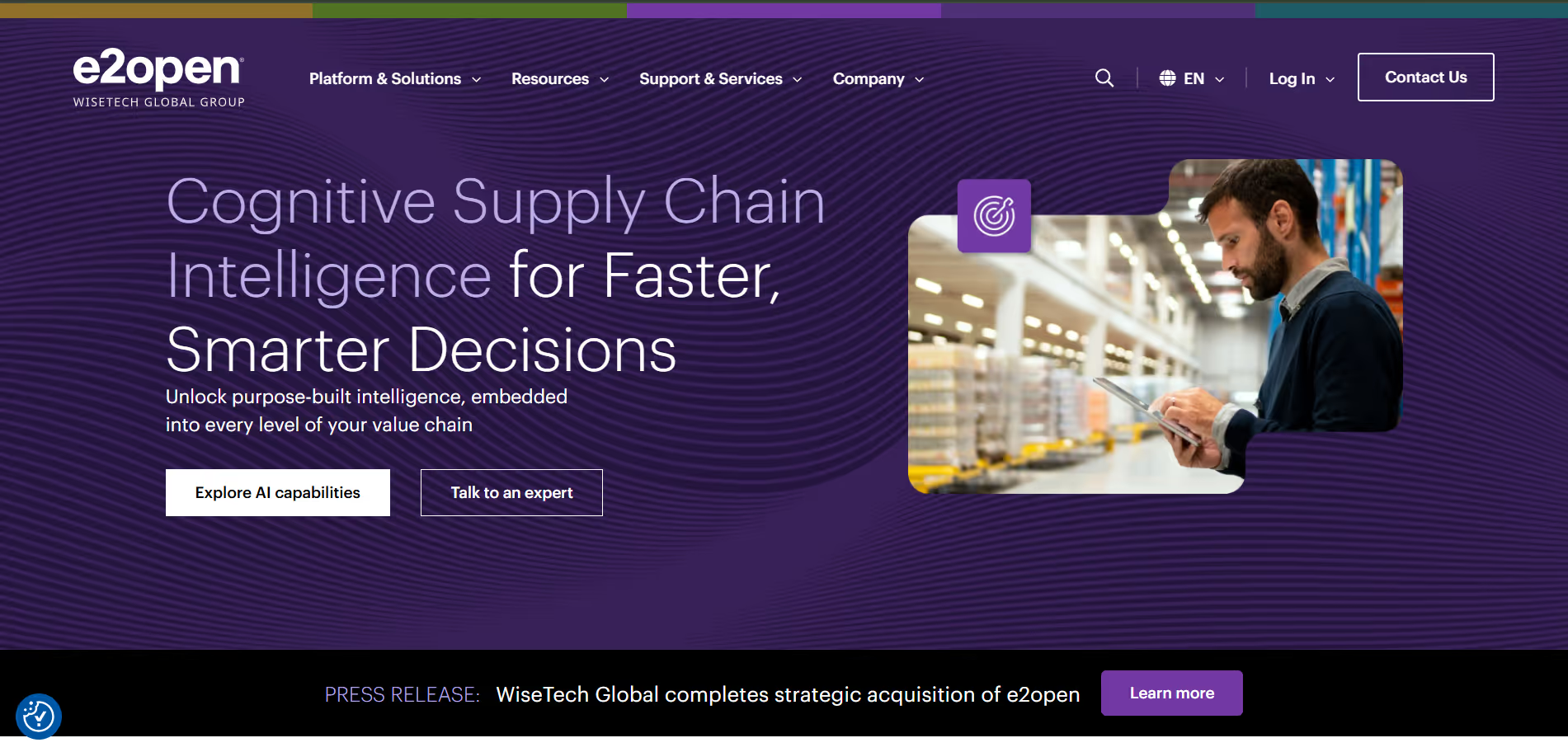
Key Features:
- AI-driven demand forecasting
- Multi-tier planning and supplier collaboration
- Advanced analytics dashboards
Best For:
Enterprises coordinating inventory planning across global supply networks.
Pros:
- Great for large, global operations
- Strong collaboration and data visibility
Cons:
- Not suitable for smaller teams
- High complexity and cost
Pricing:
Enterprise-level, quote-based pricing.
Conclusion
At its core, inventory planning isn’t about software. It’s about control, knowing exactly what to restock, when to move, and where to grow next.
The right platform gives you the confidence to scale without second-guessing every decision.
Every tool on this list has its strengths and ultimately, the best inventory planning software depends on how complex your inventory is today and how much control you need as your business scales.
If your next stage of growth depends on precision, agility, and speed, then the smartest move isn’t adding more tools, it’s choosing the right one.
Try Sumtracker free for 14 days.
FAQS
What is inventory planning software?
Inventory planning software helps you forecast demand, plan restocks, and maintain the right stock levels across channels.
Why is inventory planning important for eCommerce brands?
Good planning keeps your bestsellers in stock, avoids overselling and frees up cash stuck in excess inventory helping your business scale smoothly.
When should a Shopify brand start using inventory planning software?
Most Shopify brands benefit from inventory planning once they manage multiple SKUs, sell across more than one channel, or experience frequent stockouts or overordering.
Is inventory planning software only useful for large businesses?
No. While large businesses rely heavily on advanced planning tools, small and mid-sized eCommerce brands also benefit from basic inventory planning.
How do I choose the right inventory planning software?
The right tool should integrate cleanly with your eCommerce platform, provide clear and actionable reorder recommendations, support your current SKU volume, and scale as your operations grow.
Conclusion
Ready to Simplify Your Inventory Management?
Join hundreds of e-commerce merchants who rely on Sumtracker to save time, eliminate errors, and grow their business.
.svg)



.avif)
.png)
.avif)